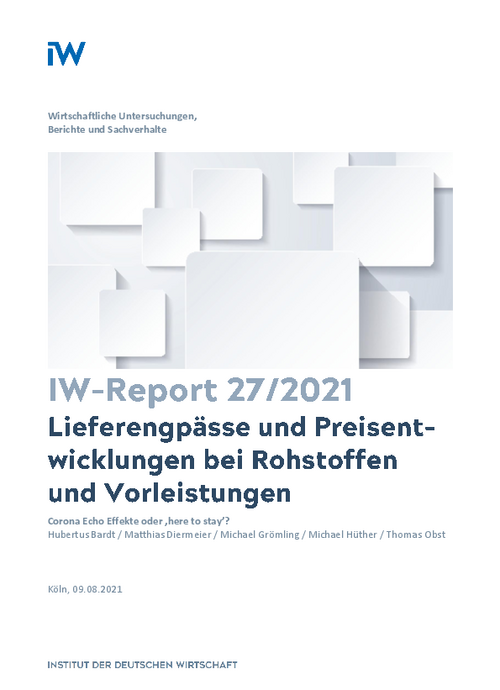Having experienced strict economic lockdowns, the post-pandemic period various sectors report severe supply side bottlenecks and price increases for intermediate goods.

Supply bottlenecks and price developments for raw materials and inputs

Having experienced strict economic lockdowns, the post-pandemic period various sectors report severe supply side bottlenecks and price increases for intermediate goods.
This may be due in part to rising energy costs, and in part to special price-driving effects in the various industries, which are causing price increases in the short, medium and possibly long run. On the one hand, Corona echo effects result from the sudden ramp-up of the global economy from the global standstill in spring 2020. The logistics sector in particular is facing major challenges and different markets experience significant pandemic-related adjustments to supply and demand. These ruptures are expected to rebound in the medium term. On the other hand, the climate change related structural change is going to limit the production of specific co-products of the petroleum industry in the long run. And, also the ongoing uncertainty regarding protectionism might have a prevailing effect on price developments.
In this context, the German Economic Institute polled around 2,000 companies questioning about factors that determine their price development in the short and medium term. The companies were also asked to what extent they could pass on higher production costs to their customers. For around 80 percent of the companies surveyed, more expensive raw materials and scarce inputs have a strong or medium effect on their own price development. The rise in energy prices alone is causing a strong or medium price increase for around 70 percent of the companies.
Compared with industry and construction firms, the price effects are experienced to a much lesser extent by service companies. In both construction and industrial sectors, the price-driving effects of scarce raw materials and intermediate inputs are expected to diminish in the medium term. By contrast, both sectors expect price effects from more expensive energy in the medium term. With regard to labor costs and administrative costs, the industrial and construction companies also expect price-driving effects in the medium term. By contrast, demand in the industrial and construction sector are likely to ease.
Almost half of the companies experiencing strong or medium cost effects will be able to pass these on to their customers to a significant extent. For a further 40 percent, there is little scope for price increases; for just under 10 percent there is no room for price increases. The scope for passing on costs is highest in the construction industry, while service companies are considerably more reluctant in doing so.
For the macroeconomic evaluation of this development, it is significant that there are no signs of acute price pressure in terms of inflation expectations, money supply or capacity utilization. With regard to supply-side factors such as the oil price hike or supply side bottlenecks, it is unclear whether inflation will remain temporary or whether the multifaceted price drivers will lead to a permanent price increase. This depends heavily on potential second-round effects in the goods market and labour market.

Supply bottlenecks and price developments for raw materials and inputs

More on the topic

Effects of the Middle East conflict on the German economy
Beyond the humanitarian crisis associated with the geopolitical conflict in Israel, which affects millions of human lives, the Middle East conflict also leaves lasting marks on economic activity not only in the affected region, but also in Germany and the ...
IW
Corporate Insolvencies on the Increase
After a prolonged decline, the number of corporate insolvencies has begun to rise again. The slight increase in 2022 could be interpreted as a step towards normalisation after the sharp drop experienced during the 2020/21 Covid19 pandemic.
IW